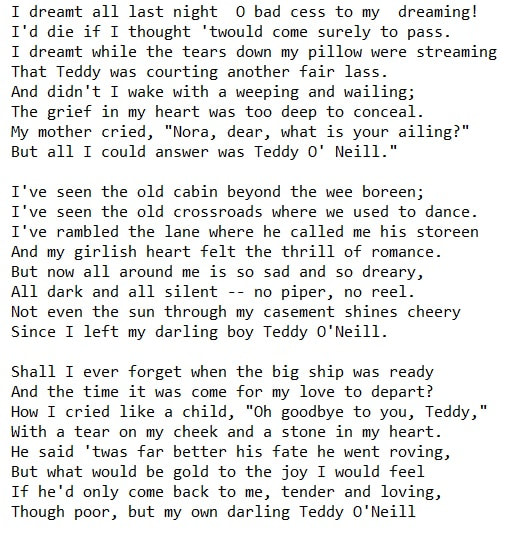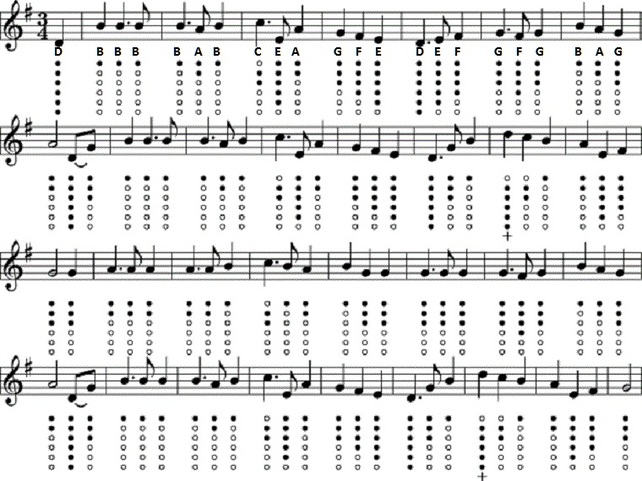Teddy O'Neill Song Lyrics And Guitar Chords
A traditional song written around 1840 and most likely comes from the North of Ireland. The lyrics in the first verse suggest it's all a dream but by the third verse it becomes a reality for Nora [song] as her true loves leaves on a ship. The guitar chords are in the key of G And also D in chordpro. This song is usually sang by Women. The youtube video is by Delores Keane who is one of Ireland's finest contemporary ballad singers. The sheet music and tin whistle notes are included. My Own Dear Galway Bay [ lyrics ] is the song Delores Keane is best known for around these parts. In 2022 Teddy O'Neill was the party piece for the Westmeath Rose Rachel Duffy
from Moate who went on to win the contest.
The sheet music / mandolin / tenor banjo tab for Teddy O'Neill is in the ebook of mandolin tabs here . The tin whistle notes are in my other ebook of songs here
from Moate who went on to win the contest.
The sheet music / mandolin / tenor banjo tab for Teddy O'Neill is in the ebook of mandolin tabs here . The tin whistle notes are in my other ebook of songs here
[G]I dreamt all last night O bad [C]cess to [Am]my [D]dreaming!
I'd [G]die if I [Em]thought 'twould come [A7]surely to [D]pass.
I [G]dreamt while the tears down my [C]pillow [Am]were [D]streaming
That [G]Teddy was [E]courting a[A]nother [D]fair [G]lass.
And [D]didn't I wake with a [D7]weeping and [G]wailing;
The [Em]grief in my heart was too [A]deep to con[D]ceal.
My [G]mother cried, "Nora, dear, [C]what is [Am]your [D]ailing?"
But [G]all I could [E]answer was [A]Teddy [D]O'[G]Neill."
I've seen the old cabin beyond the wee boreen;
I've seen the old crossroads where we used to dance.
I've rambled the lane where he called me his storeen
And my girlish heart felt the thrill of romance.
But now all around me is so sad and so dreary,
All dark and all silent -- no piper, no reel.
Not even the sun through my casement shines cheery
Since I left my darling boy Teddy O'Neill.
Shall I ever forget when the big ship was ready
And the time it was come for my love to depart?
How I cried like a child, "Oh goodbye to you, Teddy,"
With a tear on my cheek and a stone in my heart.
He said 'twas far better his fate he went roving,
But what would be gold to the joy I would feel
If he'd only come back to me, tender and loving,
Though poor, but my own darling Teddy O'Neill
I'd [G]die if I [Em]thought 'twould come [A7]surely to [D]pass.
I [G]dreamt while the tears down my [C]pillow [Am]were [D]streaming
That [G]Teddy was [E]courting a[A]nother [D]fair [G]lass.
And [D]didn't I wake with a [D7]weeping and [G]wailing;
The [Em]grief in my heart was too [A]deep to con[D]ceal.
My [G]mother cried, "Nora, dear, [C]what is [Am]your [D]ailing?"
But [G]all I could [E]answer was [A]Teddy [D]O'[G]Neill."
I've seen the old cabin beyond the wee boreen;
I've seen the old crossroads where we used to dance.
I've rambled the lane where he called me his storeen
And my girlish heart felt the thrill of romance.
But now all around me is so sad and so dreary,
All dark and all silent -- no piper, no reel.
Not even the sun through my casement shines cheery
Since I left my darling boy Teddy O'Neill.
Shall I ever forget when the big ship was ready
And the time it was come for my love to depart?
How I cried like a child, "Oh goodbye to you, Teddy,"
With a tear on my cheek and a stone in my heart.
He said 'twas far better his fate he went roving,
But what would be gold to the joy I would feel
If he'd only come back to me, tender and loving,
Though poor, but my own darling Teddy O'Neill
Rachel Duffy Singing Teddy O'Neill At The Rose Of Tralee
Here are the chords in the key of D
[D]I dreamt all last night O bad [G]cess to [Em]my [A]dreaming!
I'd [D]die if I [Bm]thought 'twould come [E7]surely to [A]pass.
I [D]dreamt while the tears down my [G]pillow [Em]were [A]streaming
That [D]Teddy was [B]courting a[E]nother [A]fair [D]lass.
And [A]didn't I wake with a [A7]weeping and [D]wailing;
The [Bm]grief in my heart was too [E]deep to con[A]ceal.
My [D]mother cried, "Nora, dear, [G]what is [Em]your [A]ailing?"
But [D]all I could [B]answer was [E]Teddy [A]O'[D]Neill."
[D]I dreamt all last night O bad [G]cess to [Em]my [A]dreaming!
I'd [D]die if I [Bm]thought 'twould come [E7]surely to [A]pass.
I [D]dreamt while the tears down my [G]pillow [Em]were [A]streaming
That [D]Teddy was [B]courting a[E]nother [A]fair [D]lass.
And [A]didn't I wake with a [A7]weeping and [D]wailing;
The [Bm]grief in my heart was too [E]deep to con[A]ceal.
My [D]mother cried, "Nora, dear, [G]what is [Em]your [A]ailing?"
But [D]all I could [B]answer was [E]Teddy [A]O'[D]Neill."
Teddy O'Neill is a traditional Irish song that tells the story of a young man named Teddy who is deeply in love with a girl named Mary. The song has a melancholic yet romantic tone, and it has been a popular folk tune in Ireland for many years. Its origins can be traced back to the 19th century, and it has since been covered by various artists and has become a staple in Irish music.
Throughout this thesis, we will explore the origins and history of the Teddy O'Neill song, its lyrics and meaning, and its impact on Irish culture and music.
The origin of the Teddy O'Neill song can be traced back to the 19th century. It is said that the song was written by an Irishman named James Thornton, who was a member of the Irish Volunteers, a nationalist organization that fought for Irish independence from British rule. The song was written during a time of great political turmoil in Ireland, and it is believed that the character of Teddy O'Neill represents the Irish people and their struggle for freedom.
The lyrics of the song tell the story of Teddy O'Neill, a young man who is deeply in love with Mary, but their love is forbidden due to their social class difference. Despite this, Teddy remains devoted to Mary and expresses his love for her in the song. The lyrics are simple yet powerful, and they evoke a sense of longing and sadness for a love that cannot be.
The song's chorus, 'Teddy O'Neill, my darling boy, I'll never see you more. Before I die, I'll bless the day I saw you at my door,' is particularly poignant, as it reflects the pain and heartache of a love that is destined to be unfulfilled. This theme of forbidden love is a common one in Irish folk songs, and it adds to the emotional depth of the Teddy O'Neill song.
The Teddy O'Neill song has had a significant impact on Irish culture and music. It has been covered by numerous artists, both in Ireland and abroad, and has become a beloved folk tune. The song's popularity is a testament to its enduring message of love and sacrifice, which resonates with people of all ages and backgrounds.
In addition to its musical impact, the Teddy O'Neill song has also been a source of national pride for the Irish people. The song's themes of love, struggle, and sacrifice are deeply ingrained in Irish culture, and it has become a symbol of the Irish spirit and resilience.
Moreover, the Teddy O'Neill song has also been used as a political tool in Ireland. During the Irish War of Independence in the early 20th century, the song was often sung at rallies and gatherings to inspire and unite the Irish people in their fight for independence. It became a symbol of hope and determination, and its lyrics served as a reminder of the sacrifices made by those who fought for Irish freedom.
In conclusion, the Teddy O'Neill song is a timeless piece of Irish music that has stood the test of time. Its simple yet powerful lyrics, its melancholic yet romantic tone, and its enduring message of love and sacrifice have made it a beloved folk tune in Ireland. Its impact on Irish culture and music cannot be overstated, and it will continue to be a source of inspiration and pride for the Irish people for generations to come.
Throughout this thesis, we will explore the origins and history of the Teddy O'Neill song, its lyrics and meaning, and its impact on Irish culture and music.
The origin of the Teddy O'Neill song can be traced back to the 19th century. It is said that the song was written by an Irishman named James Thornton, who was a member of the Irish Volunteers, a nationalist organization that fought for Irish independence from British rule. The song was written during a time of great political turmoil in Ireland, and it is believed that the character of Teddy O'Neill represents the Irish people and their struggle for freedom.
The lyrics of the song tell the story of Teddy O'Neill, a young man who is deeply in love with Mary, but their love is forbidden due to their social class difference. Despite this, Teddy remains devoted to Mary and expresses his love for her in the song. The lyrics are simple yet powerful, and they evoke a sense of longing and sadness for a love that cannot be.
The song's chorus, 'Teddy O'Neill, my darling boy, I'll never see you more. Before I die, I'll bless the day I saw you at my door,' is particularly poignant, as it reflects the pain and heartache of a love that is destined to be unfulfilled. This theme of forbidden love is a common one in Irish folk songs, and it adds to the emotional depth of the Teddy O'Neill song.
The Teddy O'Neill song has had a significant impact on Irish culture and music. It has been covered by numerous artists, both in Ireland and abroad, and has become a beloved folk tune. The song's popularity is a testament to its enduring message of love and sacrifice, which resonates with people of all ages and backgrounds.
In addition to its musical impact, the Teddy O'Neill song has also been a source of national pride for the Irish people. The song's themes of love, struggle, and sacrifice are deeply ingrained in Irish culture, and it has become a symbol of the Irish spirit and resilience.
Moreover, the Teddy O'Neill song has also been used as a political tool in Ireland. During the Irish War of Independence in the early 20th century, the song was often sung at rallies and gatherings to inspire and unite the Irish people in their fight for independence. It became a symbol of hope and determination, and its lyrics served as a reminder of the sacrifices made by those who fought for Irish freedom.
In conclusion, the Teddy O'Neill song is a timeless piece of Irish music that has stood the test of time. Its simple yet powerful lyrics, its melancholic yet romantic tone, and its enduring message of love and sacrifice have made it a beloved folk tune in Ireland. Its impact on Irish culture and music cannot be overstated, and it will continue to be a source of inspiration and pride for the Irish people for generations to come.
And included below is a pdf file of the sheet music lyrics and chords





